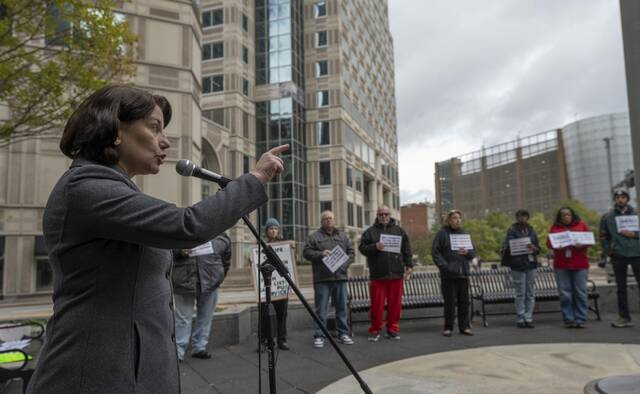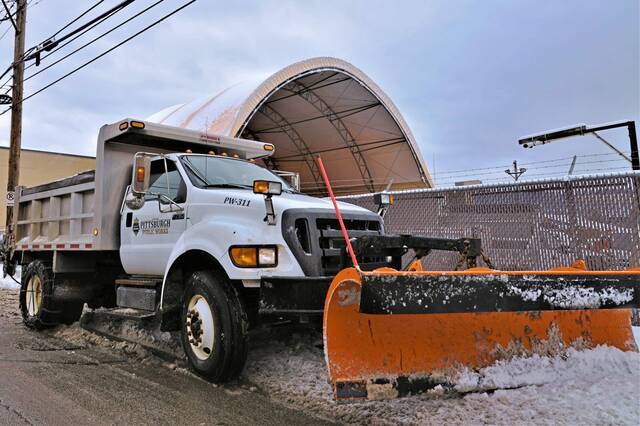Elizabeth McPeak on Thursday was glad to be driving to work for the first time since she was furloughed in early October, one of hundreds of thousands of federal workers shut out of their offices during a lengthy government shutdown.
McPeak is vice president of Chapter 34 of the National Treasury Employees Union, which represents about 500 workers throughout Western Pennsylvania.
She told TribLive she and her colleagues were happy to return to their jobs Thursday. But ending the shutdown doesn’t erase the damage caused by a 43-day halt of the federal government, she said. After Congress inked a deal to keep the government funded only through January, federal workers remain uneasy.
“Throughout this historically long shutdown, the American people have paid the price and federal workers have paid the price,” McPeak said. “It’s been grossly unfair for us to be locked out of our offices, and we’re anxious to get back to work.”
She said the news that the federal government was reopening was met with a “deep sigh of relief” — but also lingering worries.
About half of the workers represented by the local chapter — including tax advocates, auditors and revenue officers, many of whom work at the William S. Moorhead Federal Building in Downtown Pittsburgh — were furloughed.
McPeak said federal employees are anxious to receive back pay. Some of her colleagues have sought help from food pantries, asked their mortgage lenders for help or relied on family support to make ends meet while they scraped by without paychecks.
“Those folks are still on pins and needles waiting for those back-pay checks to come through,” McPeak said. “Nobody can miss two paychecks without struggling. If you’re working for a living, you’re working for your pay.”
After prior shutdowns, she said, those checks typically came “fairly quickly.” McPeak is hopeful the same will prove true this time.
Lilas Soukup, president of the American Federation of Government Employees Local 1916, said she, too, is hoping workers will receive paychecks efficiently. Different agencies operate on different systems and timelines, she said.
Soukup’s union chapter represents about 280 local federal workers employed by the Centers for Disease Control and Prevention and the Department of Energy.
The Department of Energy employees she represents continued working with pay during the shutdown. But the majority of the CDC workers under her union were furloughed with no pay. She said it was unclear Thursday how quickly they’d return to work and receive the wages they’re owed.
“Everyone’s still in a holding pattern,” she said.
Soukup said workers are relieved to be back at their jobs, but there are still looming questions over funding and whether officials will craft a long-term budget before the money dries up again early next year.
“It would be great if it was a full budget, but we don’t have that,” she said.
As federal workers return to their jobs, McPeak said, many will be facing a backlog of work that piled up during the shutdown.
“As a survivor of past shutdowns that were shorter, there is a very significant long-term effect to a federal government shutdown,” she said. “It isn’t just the immediate 40-plus days. It goes on for months and months and months.”
For example, taxpayer advocates are now delayed in helping Americans resolve issues like getting tax rebates. Auditors who ensure large corporations pay their fair share in taxes haven’t been able to serve as fiscal watchdogs, leaving them behind in monitoring companies that continued to operate while the federal government was shuttered.
“It’s not as simple as picking up where you left off,” McPeak said. “The federal government stopped, but the world didn’t stop. There’s a tremendous backlog when we come back from any shutdown.”
After previous shutdowns, McPeak said, workers across various federal agencies have clocked extra overtime hours to catch up. That costs taxpayers money, she pointed out.
“There’s only so many of us,” she said. “There’s only so much we can do in a day.”
U.S. Rep. Chris Deluzio, D-Fox Chapel, criticized the federal funding deal. Deluzio voted against it because he “wasn’t about to roll the dice on my constituents’ health care,” which was a sticking point throughout the shutdown.
Democrats made as a condition for ending the shutdown the extension of a tax credit meant to make Obamacare cheaper. But Republicans refused, and the Democratic senators who defected to vote with the GOP to end the stalemate did not secure any guarantees on extending the credit.
“Unfortunately, federal workers now may have a more urgent issue to deal with: This was such a weak deal that Trump and congressional Republicans are already finding ways to rip it to shreds,” Deluzio said.
He also raised concerns about whether Republicans will rehire staff fired during the shutdown.
Philip Glover, national vice president of District 3 for the American Federation of Government Employees, said about 3,000 federal workers will return to work and start receiving pay throughout Southwestern Pennsylvania from numerous agencies.
They include the Transportation Security Administration, Bureau of Prisons, Veterans Affairs, National Park Service, Housing & Urban Development, Small Business Administration, Equal Employment Opportunity Commission and Social Security Administration.
Glover acknowledged the possibility of another shutdown.
“If health care isn’t fixed, I could see it happening again,” Glover said in a written statement.
While returning to work is a good thing, McPeak said, her happiness is tempered by the knowledge that the spending plan Congress approved Wednesday night funds the government only through January.
“We would urge everyone in Congress to find a way to properly fund the government, because we’ve been given a temporary reprieve,” McPeak said. “The deal that was struck is just for a few months. And we are staring down the barrel of another potential shutdown at the end of January. And that is a frightening prospect, not just for federal workers but for all of America. To go through this again would be unconscionable.
”This shutdown was detrimental. We cannot do it again in January.”








